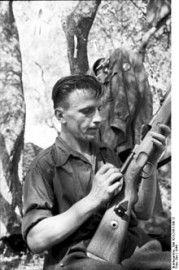March 1945 marks the anniversary of the start of the Po Valley Offensive in Italy, which ended at the end of April with the surrender of 800.000 German soldiers and 300.000 Italian soldiers, all well equipped and armed. If these troops stationed in Italy would have followed to the letter the orders of Hitler, then the Italian campaign would have ended in a great bloodbath. They surrendered earlier than Germany (May, 8th) because of the secret talks carried out in Switzerland by Dr. Allan Dulles – the future head of the CIA – on one side, General Wolff of the Waffen SS and some Italians on the other. This had been code-named Operation Sunrise. Possibly Mussolini was in the know even if he pretended ignorance. And this, perhaps, may have been the ultimate reason explaining his mysterious death. It is well known that the Americans wanted to capture Mussolini and have him tried in a Court of Law, while the British, with W. Churchill at their head, refused to comply and wanted him shot on the spot.
Dr Deric Daniel Waters, could be called a living treasure of Hong Kong. He fought valiantly during the Second World War as a Desert Rat with the Eight Army in the famous combat in North African deserts and later fought alongside the American Fifth Army in Salerno and Anzio, Italy. He was mentioned in Despatches and wounded three times. After hostilities ceased he rejoined the family building business established by his great-grandfather in 1853. He then joined the Colonial Office of Britain and set sail to Hong Kong in 1954. He taught building technology and the related subjects in the Hong Kong Technical College that has since become The Hong Kong Polytechnic University. He was then made the Principal of the Morrison Hill Technical Institute in 1969 and transferred to the Government Education Department Headquarters in 1972 for planning and administration. He went on leave pending retirement from the Government in 1980. During the 1980s up to the present, he has written several papers for the Journal of the Royal Asiatic Society Hong Kong Branch including the stories about CSM John Osborn VC, “Hong Kong Hongs with Long Histories and British Connections”, “Foreigners and Fung Shui”, “Chinese Funerals”,etc. He has also published his works through other mediums. Dr. Waters had declared in an interview: ” I was born in the city of pubs and churches. There is a pub for every day of the year and there is a church for every week of the year, and that’s Norwich (England) in other words, a famous old city. During the war I joined the Eighth Army, I fought in the desert, I was wounded three times, superficially, not badly, but I still have shrapnel in my body. After Africa we went across to Italy, to Salerno. It was the first invasion during the war where the Allies met resistance.”

Once I exchanged letters with him on the South China Morning Post about the War in Italy, which caused so much destruction and pains on both sides. I had written that the invasion of Italy by the Allies had been a costly mistake, caused by British Prime Minister’s W. Churchill wanting to play the role of the great strategist. Churchill had indeed many gifts but he did not possess the necessary coolness to be a great general. My statement understandably caused a reaction by Dr. Waters, he answered saying that the 1944 landing in Normandy could have not be carried out one year earlier, as General Marshal was proposing, and that Churchill had been a great leader. Here is my answer to Dr. Waters, which the SCMP did not publish:
I wish to thank Dr. Dan Waters for his kind answer to my letter (Failure not an option in 1944, June 20 2013) in which he points out that a D-Day landing in 1943 was not possible, as I did claim. In fact it was planned in 1943 and the date set by General George C. Marshal and Eisenhower was April 1, then Churchill opposed it and the massed troops were diverted to Italy. Churchill’s decision to land in Italy, which he called “the soft belly of Axis”, achieved very little in terms of shortening the war with Germany, as the Allies discovered that the “soft-belly” was not so soft as they expected: this is due to the ridge of mountains, the Apennines, running through its length and the Alps on the North. Furthermore between 1942 and 1944 military hardware productions in Germany increased by three folds in spite of the bombings and we should not forget that by 1943 there were not defences ready in Normandy: Rommel had not set up the Atlantic Wall defence system and the bulk of German divisions were still deep inside Russia. True that failure was not an option but no one can compare the tactical and strategic capabilities of General C. Marshal, Dwight Eisenower and Albert Wedemeyer versus those of a Winston Churchill, a fine speaker and a cunny politician, but a dilettante in war matters.
Let me quote a profile of W.C. written by military historian F.F.C. Fuller in 1961 for his book “Conduct of War” but suppressed by his editor, fearing a sue for libel:
W. Churchill was a man of unlimited courage, he was possessed of brilliant but unstable intellect, and was erratically imaginative and profoundly emotional. A militarist to his fingertips, he loved war for his own sake, and yet, when soft emotion stirred him, tears would well up in eyes. As a stateman he was out of his depth, because so often he confused means and ends, and failed to realize that a statesman’s first task is to prevent war, and his second, should be this be impoissible, to bring war to a profitable and speedy end. As a strategist he was a calamity, and because of his pugnatious temperament and love of fighting, tactics fitted him better. But, unfortunately, the glamour of battle – most of which is apocryphal – so completely intoxicated him that killing of Germans became his irresistible aim. Had he been a corporal, this would have been his keeping, but it had nothing whatever to do with the duties of a Minister of Defence. The truth would appear to be that throughout his turbulent life he never quite grew up, and like a boy, loved big bangs and playing at soldiers
Moder historiography and the uncovering of new documents, which W.C had not been able to suppress, seem to point that in this suppressed passage there is a lot of truth. Even if, as usual, history is written by the victors.

